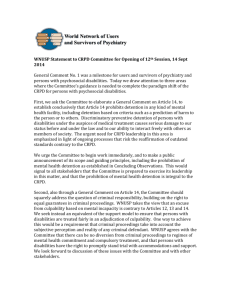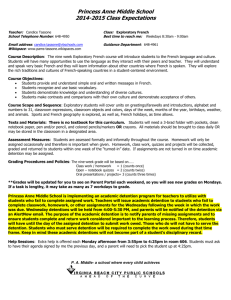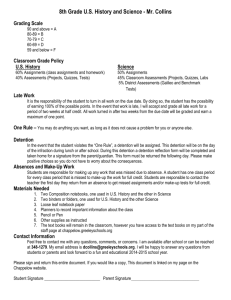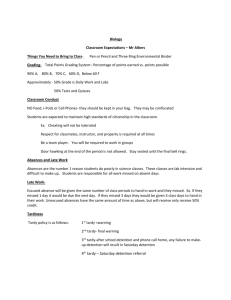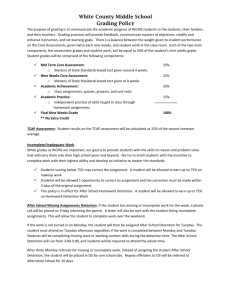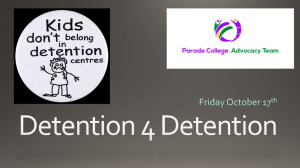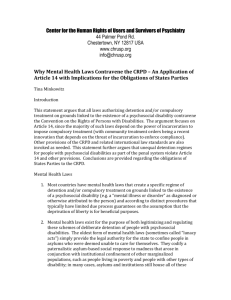CHRUSP - Office of the High Commissioner on Human Rights
advertisement
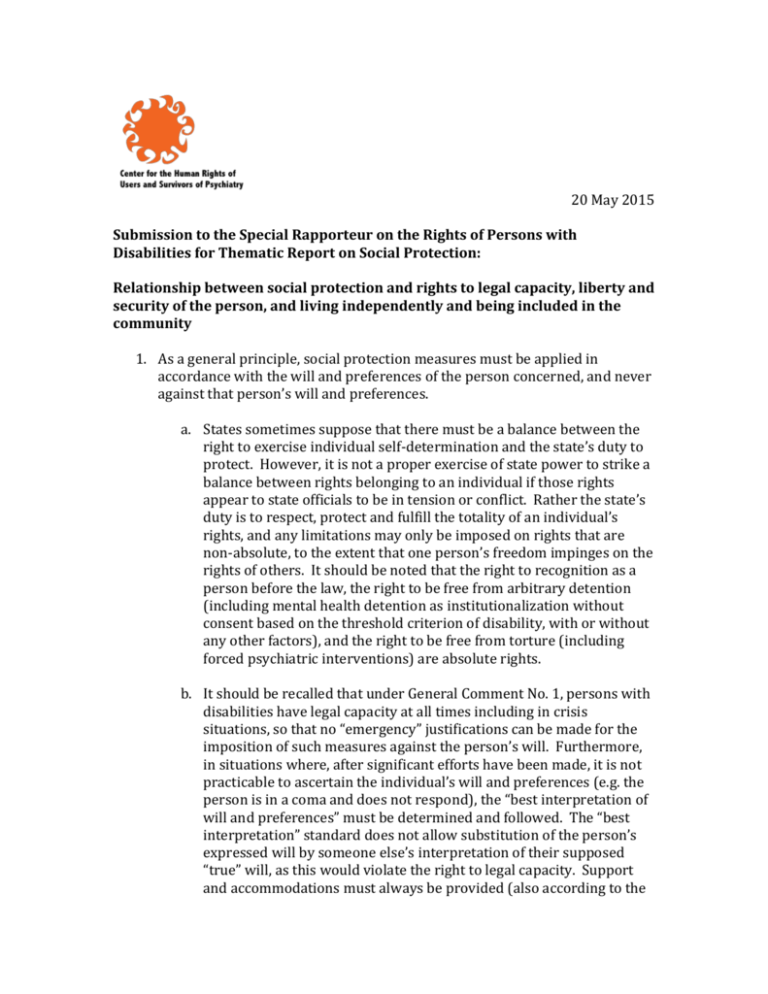
20 May 2015 Submission to the Special Rapporteur on the Rights of Persons with Disabilities for Thematic Report on Social Protection: Relationship between social protection and rights to legal capacity, liberty and security of the person, and living independently and being included in the community 1. As a general principle, social protection measures must be applied in accordance with the will and preferences of the person concerned, and never against that person’s will and preferences. a. States sometimes suppose that there must be a balance between the right to exercise individual self-determination and the state’s duty to protect. However, it is not a proper exercise of state power to strike a balance between rights belonging to an individual if those rights appear to state officials to be in tension or conflict. Rather the state’s duty is to respect, protect and fulfill the totality of an individual’s rights, and any limitations may only be imposed on rights that are non-absolute, to the extent that one person’s freedom impinges on the rights of others. It should be noted that the right to recognition as a person before the law, the right to be free from arbitrary detention (including mental health detention as institutionalization without consent based on the threshold criterion of disability, with or without any other factors), and the right to be free from torture (including forced psychiatric interventions) are absolute rights. b. It should be recalled that under General Comment No. 1, persons with disabilities have legal capacity at all times including in crisis situations, so that no “emergency” justifications can be made for the imposition of such measures against the person’s will. Furthermore, in situations where, after significant efforts have been made, it is not practicable to ascertain the individual’s will and preferences (e.g. the person is in a coma and does not respond), the “best interpretation of will and preferences” must be determined and followed. The “best interpretation” standard does not allow substitution of the person’s expressed will by someone else’s interpretation of their supposed “true” will, as this would violate the right to legal capacity. Support and accommodations must always be provided (also according to the person’s will and preferences) so that the person can express his or her will and preferences most effectively. 2. Social protection schemes and programs must respect the rights to legal capacity, liberty and security of the person, and living independently and being included in the community. a. Institutional living arrangements (large and small institutions as defined in OHCHR study on Article 19) and institutional forms of service provision (mental health, rehabilitation, practical assistance in everyday life, support for employment) do not fulfill the right to social protection, and instead constitute human rights violations. b. Involuntary and coercive measures, such as mental health detention, institutionalization and compulsory inpatient or outpatient treatment, do not fulfill the right to social protection and instead constitute human rights violations. There is an immediate obligation to release all persons from mental health detention, involuntary institutionalization and compulsory treatment orders. Release from involuntary measures does not mean that the person is no longer provided with desired services: if the person wishes to remain in an institution because they have nowhere else to go, or if the person wants to receive services in a hospital or in the community, they must not be denied those services. It is a violation of both social protection rights and liberty/security/legal capacity rights to withdraw services from an individual or stop providing them generally in response to the obligation to stop imposing these services on an involuntary and coercive basis. It is also a violation of these rights to make the provision of housing or any service conditional on acceptance of another service that may be undesired (e.g., housing tenancy being conditional on being under psychiatric treatment and complying with drugs) or on the waiver of any human right (such as the right to legal capacity). c. Social protection schemes must not be made conditional on a declaration of incapacity or on the transfer to another person of the management of funds (“representative payee” arrangements). These conditions violate the right to legal capacity and also violate the right to social protection because of the conditionality. 3. Without proper social protection schemes that can fulfill the right to an adequate standard of living, people with disabilities are at increased risk of institutionalization, mental health detention and compulsory treatment. This is also related to discrimination in employment. a. Lacking access to decent housing that allows the person to choose where and with whom to live makes people dependent on families, friends, or service providers. Conflicts arising in these situations, when they involve a person who has a prior history of (actual or perceived) psychosocial disability or psychiatric detention, or who is perceived as a person with psychosocial disability at the present time, are likely to be responded to as if the conflict actually represents an “episode” of psychosocial disability for which the person is perceived to need treatment, care and removal from the common housing. This is convenient for the non-disabled individuals involved as family members, friends or service providers, but it violates the human rights of the person with psychosocial disability. b. Discrimination in employment means that people with psychosocial disabilities are more likely than others to be unemployed. Some of this discrimination is related to the disruptions in a person’s life as a result of psychiatric detention and compulsory treatment, and as a result of the traumatizing effects of these disruptions that make it more difficult to relate to others as persons with equal status and rights and having mutual responsibilities towards each other. Other factors in discrimination include stereotypes that lead non-disabled individuals to blame the person with a psychosocial disability in case of any conflict, intersectional discrimination based on factors such as gender and race (which increase such stereotyping), and unwillingness of employers to engage in a process of reasonable (mutual) accommodation and support that the person may need in order to perform effectively. In addition, people with psychosocial disabilities may find it more difficult for people to conform to some work environments, or may need periods of time away from work, and so may have unusual career paths that some employers might take as evidence of irresponsibility or otherwise treat as a mark against the potential hire. All these factors that lead to greater unemployment among people with psychosocial disabilities in turn mean that there is a great necessity for income assistance as well as other social protection schemes, and for social protection schemes to be provided in a manner that respects the person’s dignity as a citizen of equal legal and social status as others, and that offers support to transition to decent paid employment of the person’s own choosing. Without adequate income, people with psychosocial disabilities are made more vulnerable to homelessness and to the kinds of conflict with authorities, family members, and members of the community that can result in being taken away to a psychiatric institution against one’s will. i. People with psychosocial disabilities also commonly experience disruption to their education and/or vocational training at secondary level or university. Assistance to resume or complete one’s studies, or start a new path of one’s own choosing needs to be addressed. Assistance can mean financial support, affirmative action opportunities, reasonable accommodation and any other relevant measures. This is related to the need for social protection schemes that allow for transition to paid employment of the person’s choosing; educational activities need to be accommodated as well. c. Without an adequate income and lacking access to decent social protection schemes people with psychosocial disabilities are at greater risk of running afoul of the law and being subjected to criminal arrest and detention. This can happen as a result of the greater risks of criminalization associated with poverty as well as outsider status and history of traumatization – being identified as someone of likely interest to the police, and potentially committing crimes for lack of better options or foresight. It can also happen when police use vaguely-defined crimes and powers to detain an individual for petty offenses in situations that relate to the person’s trying unsuccessfully to get his or her support needs met, or as a pretext to remove the person from the community when others experience annoyance or inconvenience and perceive it as being related to psychosocial disability. Criminalization in these ways can sometimes lead to transfer to psychiatric detention and compulsory treatment, and compulsory treatment can also be imposed in jail or prison. 4. Violation of the rights to legal capacity, liberty and security of the person, and living independently and being included in the community disrupts people’s lives, turns them into outsiders and makes it more likely that they will need to rely on social protection. a. As mentioned above in 2.a, 2.b, and 2.b.i., periods of psychiatric detention and compulsory treatment can have lasting and widespread disruptive effects in a person’s life. There is a constant interplay between these human rights violations and the vulnerability to deprivation of other rights and basic needs, such that many people remain institutionalized, deprived of their liberty and effectively segregated from the community whether hidden away in a family home or living a live that is defined by their relationship to service providers. For those who escape these confines and live in the community, the socially- and legally-approved discrimination that has been suffered results in the person being treated even more as if something is “wrong” with them to justify the terrible measures that were imposed, and can also result in the person adopting an outsider status and way of being in the world, which may not be what they most desire but instead is a means of self-defense and making do with what appears to be achievable. In other words, as a result of the disruptive and traumatizing effects of psychiatric violence, people are limiting their own lives and also experience limitations imposed by others. This is detrimental for the community, which does not benefit from the full extent of contributions the person might be able to make, and it is also detrimental for the person concerned, who might be happier with having greater freedom of choice about the extent and manner of their participation in the community. b. It would be highly appropriate to talk about reparations for the serious human rights violations of arbitrary detention (see Working Group on Arbitrary Detention Draft Basic Principles and Guidelines on Remedies and Procedures on the Right of Anyone Deprived of His or Her Liberty by Arrest or Detention to Bring Proceedings Before Court, A/HRC/30/xx, Principle 15 and Guideline 16) and torture and illtreatment (see CAT General Comment No. 3) that are comprehensive and include social protection. (See CRPD General Comment No. 1, paragraphs 40 and 42 regarding the recognition of detention of persons with disabilities in institutions against their will as arbitrary detention, and the recognition of forced psychiatric treatment as an infringement of the freedom from torture and ill-treatment; see also WGAD Draft Basic Principles and Guidelines, Principle 20 and Guideline 20 regarding the recognition of involuntary committal based on actual or perceived disability as arbitrary detention). For people who have been subjected to serious human rights violations there is often a need for social protection measures as a component of reparations, and framing it as such contributes to public recognition and acknowledgement of the truth concerning such violations and to restoration of the honor and social position of victims. Both these concerns are of importance to people with psychosocial disabilities in order to overturn a severe level of discrimination that has come to be taken for granted, so that we can start on an equal basis with others to address ordinary measures of non-discrimination and social protection for the future. The Center for the Human Rights of Users and Survivors of Psychiatry (CHRUSP) provides strategic leadership in human rights advocacy, implementation and monitoring relevant to people experiencing madness, mental health problems or trauma. In particular, CHRUSP works for full legal capacity for all, an end to forced drugging, forced electroshock and psychiatric incarceration, and for support that respects individual integrity and free will. Tina Minkowitz, Esq. tminkowitz@earthlink.net www.chrusp.org
